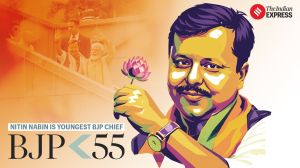Misses G
This suitably sanitised,star-struck biography has few answers to the many intriguing questions surrounding Sonia Gandhis life
Sonia Gandhi: An Extraordinary Life,An Indian Destiny
Rani Singh
Palgrave/Pan Macmillan
Pages: 288
Rs 499
We are still a long way off from accepting Kitty Kelley-style biographies in India: intimate portraits of iconic figures,warts and all. There is a particularly reverential approach towards Sonia Gandhi who lost her husband tragically,and by relinquishing the prime ministers post,put herself on a pedestal. Which explains why The Red Sari,a fictionalised but largely laudatory account of Sonia,was never published in India. Pressure was put on the Spanish publisher and the author Javier Moro not to bring out an Indian edition. The publisher backed down,even though the book has done well in several European languages. Thus it should come as no surprise that Sonia Gandhi by Rani Singh is suitably sanitised,star-struck and simpering. No one can take exception to it. It comes with a foreword by Mikhail Gorbachev and a recommendation from Henry Kissinger. It is meant primarily for foreign readers,and the author has provided a brief history of the period and explanations.
Singh notes in her introduction that the purpose of writing the book is not to provide a definitive political critique with a scoreboard of achievements and mistakes of any of the main players involved. She has simply tried to tell Sonias story using research and interviews with those who knew her. Apart from Sonias few interviews to journalists,Singh relies on secondary sources,most of who are so awe-struck and adulatory that they still remember such trivia like what juice she wanted to drink and whose brocade sari she admired. Singh fails,in the bargain,to bring alive the person. Nor does she reconcile the contradictions in the life story of the countrys most powerful politician. On the one hand,Singh quotes Sonias friends from her Cambridge days not the university but the town,describing her as a well-dressed,well-turned-out,self-assured young woman. On the other,she characterises Sonia the young bride as a simple straightforward girl from an unsophisticated family docile and accommodating. There are several references to Sonias antipathy to politics and her resistance to her husband Rajiv taking up the family profession after his brother Sanjay Gandhis death. But there is no satisfactory explanation as to how Sonia herself managed to fit in so seamlessly into the backstabbing,manipulative political world. Why,if Sonia was so vehemently against her husband joining politics,did she oppose Maneka Gandhi being appointed as India Gandhis personal secretary and ensured that her mother-in-law withdrew the offer?
There are,in fact,too few answers to the many intriguing questions surrounding Sonia Gandhis life. How and why did her relationship with former prime minister P.V. Narasimha Rao plummet so rapidly? How did she trump such a canny political player like Sharad Pawar on the issue of her foreign origin? What made her install Manmohan Singh as prime minister and what is the dynamics of the relationship today? Rani Singh,a London-based broadcast journalist,is herself unfamiliar with the Indian milieu. A major booboo is her interpretation of aam admi,the common man for whom the Congress targeted all its programmes. The author believes that aam admi stands for mango man,a person who carries a basket of mangoes on his head.
Sonia Gandhi has lived an extraordinary life with many highs and lows. Her journey from the tiny town of Lusiana with less than 3,000 people in the lower Alps of northeast Italy to become the unofficial ruler of India,is a fascinating tale. To reach where Sonia has requires far more than just being married into the right family. It has taken guts,determination and some very special skills. Sonia Gandhi surely deserves a more discerning,thoughtful and enterprising biographer.
- 01
- 02
- 03
- 04
- 05































